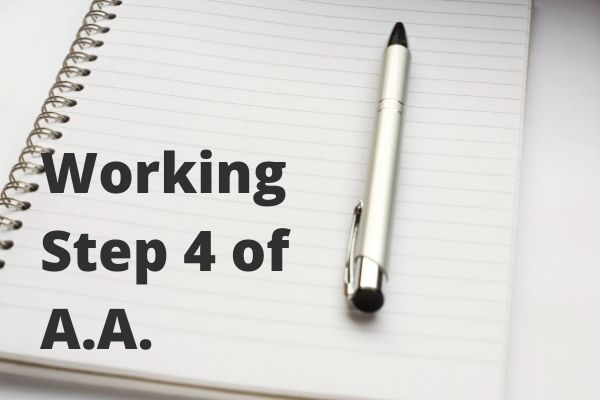“Made a searching and fearless moral inventory of ourselves.”
The Purpose of Step Four
In the original text of the 12 steps, the author says that “misdirected instincts” are the cause of physical and mental liabilities, and essentially, addiction itself. The goal of taking a “moral inventory” is to determine the cause(s) of your drinking addiction. It is one of the first deep dives into an addict’s instincts, desires, and motivations. Identifying these is an important gateway to uncovering the underlying root cause of compulsive (and destructive) behaviors.
How To Conduct a Moral Inventory
There’s a reason the word “fearless” is included in this step, as this process is often not an easy one. To properly and sincerely look inward requires acknowledging some of the worst parts of ourselves. It requires us to confront both our conscious and unconscious feelings – the latter which may be at odds with the version of us we want to be. These affect everything from how we view the world to how we interact with others.
Self-reflection can be a huge blow to the ego and you may find it difficult to separate yourself from feelings of pride or shame. But this step is not meant to lay you bare and have you self-flagellate. Remember that Step 3 encouraged us to put our moral hangups on a metaphorical shelf under the care of a self-interpreted “higher power”. You are in the process of moving forward and embracing a better version of yourself, and the discomfort you feel is only temporary.
Potential Challenges
One of the greatest challenges in working step four lies with pride. Having made it this far you might automatically assume you have already accepted that you are imperfect, and are therefore perfectly capable of providing an impartial self-analysis. However, in many instances, the alcoholic will blame the substance as the root of all their character flaws. They consider all the negative aspects of alcoholism – and the things it has driven them to do – as something separate from who they actually are. This line of thinking is defensive and unproductive.
Those in the throes of working step 4 must understand that it is actually these character flaws that drove them to their compulsion and not the other way around. Despite the humility and honesty, asked of you in steps one, two, and three, you may still unconsciously resist the thought of having to identify your flaws as a person.
Tips for Working Step 4
The principle of the fourth step is about understanding the core of why we are who we are today. Doing so is intended to help recovering alcoholics identify their internal triggers and the factors that have shaped crucial parts of their identity. These factors are referred to as our “instincts” and they shape everything from our obsessions to how we deal with fear to what we seek in our relationships. By first understanding the “how” of our behavior, we can then move forward to the more important “why”.
- Keep a pen and paper handy and physically write out your thoughts
- Never erase an answer: No matter how embarrassing or seemingly inconsequential, you’re not supposed to pick and choose what you recall about yourself
- Take your time: As you become more adept at self-reflection and taking a personal inventory of yourself, you’ll be able to dig deeper with every attempt. Don’t expect to list every little detail about yourself in one sitting, consider this an ongoing project of self-discovery.
- Think chronologically: This will give you a solid place to start and help you anchor your thoughts. Consider significant moments in your childhood, adolescence, and adulthood that evoke strong memories – both good and bad.

I have 5 years clean n sober. My husband started stealing my disability payments and cheating p n me as well. It really kills me. I would like a drink but I know my problems will still be there the next day. I’m just hurting and sick n tired of the mess I’m in. I have to move to a new place too.